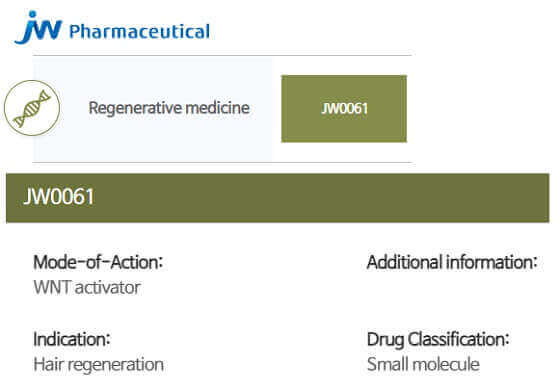Update: May 8, 2024
JW Pharmaceutical will present the preclinical results of its JW0061 Wnt pathway activating hair loss treatment in a poster presentation next week. This will occur at the US Society of Investigative Dermatology (SID) meeting, which will be held from May 15-18 in Dallas, Texas.
For the first time, JW Pharmaceutical will present the positive preclinical results of JW0061’s efficacy in human skin organoids (along with other models). Key quotes:
“Various non-clinical trials have confirmed JW0061’s excellent hair growth and follicular neo-genesis effects. JW Pharmaceutical plans to start Phase I clinical trials within the year.”
Previously, they had aimed to start clinical trials in the first half of 2024 (see bottom part of this post). In spite of the small delay, this is still positive news.
Update: August 29, 2023
JW Pharmaceutical’s JW0061 Wnt-targeted hair loss treatment just got selected as the “first national new drug development project” in 2023 in South Korea. Additionally, the company signed a research and development agreement with the Korea Drug Development Fund (KDDF). As a results, JW Pharmaceutical will receive nonclinical research funding for JW0061 for the next two years from the KDDF.
July 22, 2023
JW Pharmaceutical’s JW0061 Hair Loss Treatment
I previously mentioned JW Pharmaceutical (South Korea) in my post on activating the Wnt signaling pathway for hair growth. The latter is also referred to as the Wnt/β-Catenin pathway.
JW Pharmaceutical’s JW0061 is a first-in-class drug candidate that promotes hair regeneration by activating the Wnt pathway in skin and hair follicle stem cells. However, the company is yet to begin Phase 1 clinical trials, so I delayed writing this post. JW0061 was developed through JW Pharmaceutical’s AI-based data science platform called JWELRY. JW0061 directly binds to GFRA1 protein in dermal papilla cells and activates the Wnt signaling pathway.
Previously, by far the most well known company that was working in this area of Wnt activation and hair loss was the much hyped Samumed (US). Unfortunately, it folded in 2022 despite completing Phase 3 clinical trials.
Also of note, another South Korean company named CK Regeon (previously CK Biotech) is working on a much anticipated peptide to restore Wnt/beta-catenin signaling and hair growth. This peptide is known as PTD-DDM or KY19382. It works by inhibiting the interaction between CXXC-type zinc finger protein 5 (CXXC5) and dishevelled (Dvl). Very different from JW Pharma’s mechanism of action (see further below).

JW Pharmaceutical to Begin Clinical Trials in 2024
Yesterday, a reader sent me a link to an update on JW Pharmaceutical’s patent application for its JW0061 Wnt activator product. Apparently, the company has applied for patents in over ten countries. They already got a patent approved in Russia in March 2023, and have now obtained a patent in Australia.
On JW Pharma’s website, the product is listed as being in pre-clinical phase on the pipeline page. However, in this latest article, there is an encouraging quote:
“JW Pharmaceutical is currently conducting toxicity evaluation according to Good Laboratory Practice (GLP) at global institutions with the goal of starting clinical trials of JW0061 in the first half of 2024.”
This is confirmation of an estimate JW Pharmaceutical also gave last year. According to a company representative, JW0061 will complement and replace existing hair loss treatments. JW plans to develop JW0061 as a topical drug.
Note that even as far back as 2017, JW Pharma partnered with U Penn and Dr. George Cotsarelis to develop this very treatment. It was at the time called CWL080061.
Activating the Wnt Pathway by Binding to the GFRA1 Protein
In November 2022, JW gave a detailed update on their website in regards to the mechanism behind JW0061 and its hair growth effect. This was based on a presentation given at the Wnt 2022 conference in Japan. See the enlarged image here.
It demonstrated preclinical efficacy for hair regeneration in mice. According to preclinical data, JW0061 activates the Wnt signaling pathway by directly binding to the GFRA1 protein in dermal papilla cells.
Wnt/β-catenin signaling is crucial for hair growth in any area of the human body. It is the most researched area in the hair loss world. I must have written at least 50 posts on this blog in which I at least briefly mention Wnt. Even wounding induced hair growth (such as from microneedling or fractional lasers) is connected to activation of the Wnt/Beta-Catenin pathway.
Some natural products such as methyl vanillate also activate the Wnt/β-Catenin signaling pathway and promote hair growth. Dr. John Cole’s company used to sell a Wnt Act spray on Amazon, but it is always out of stock these days.
